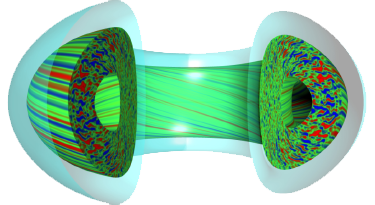Speaker
Description
When preparing the operation of a magnetic confinement fusion device, estimating the heat-load distribution on plasma-facing components expected during operation presents a critical issue. Due to the relevance of this problem, most magnetic confinement fusion laboratories can be expected to develop their own device-specific approaches to predict this heat-load distribution.
This contribution gives an overview over (some of) the current strategies employed at the Wendelstein 7-X stellarator to predict heat-load distributions on the divertor. Its main focus is on an anisotropic diffusion model developed as a middle ground between the fast calculation speed of diffusive field-line tracing and the high physical accuracy obtained by solving the Braginskii equations in the plasma edge.
To facilitate the visualization of the heat-load distributions, as well as the comparison to experimental measurements, a novel synthetic camera based approach to heat-load density estimation was developed. This method can compute the heat-load density from Monte Carlo point clouds on arbitrary geometries without being limited by the triangle density of the mesh. Such an approach has the advantage of requiring very little human interaction during preparation, and being able to handle difficult (e.g. complex and non-manifold) geometries.
Comparisons with IR camera measurements indicate that the improvement gained from anisotropic diffusion over diffusive field-line tracing is worth the added computational cost in many cases. Unsurprisingly, it does not reach the level of accuracy provided by full edge transport simulations (which do, however, require substantially more computational resources and human interaction).
This work has been carried out within the framework of the EUROfusion Consortium and has received funding from the Euratom research and training programme 2014-2018 and 2019-2020 under grant agreement No 633053. The views and opinions expressed herein do not necessarily reflect those of the European Commission.
| Country or International Organisation | Germany |
|---|---|
| Affiliation | Forschungszentrum Jülich GmbH |

